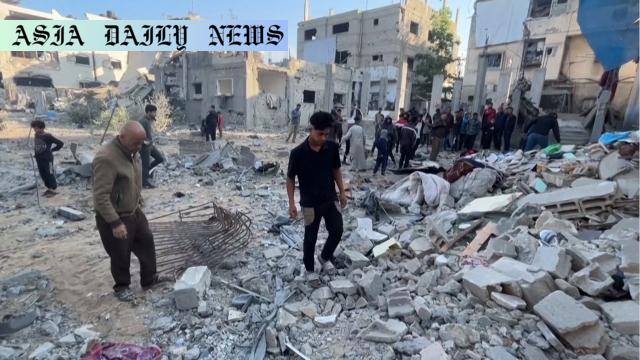Ceasefire talks have stalled as Israel recalls top negotiators in Qatar amid differences with Hamas and ongoing Gaza conflict.
- Israel recalls its top negotiators from Qatar, highlighting challenges in ceasefire talks with Hamas.
- Gaza health authorities report 82 deaths in 24 hours amid ongoing conflict.
- Hamas demands a permanent ceasefire as Israel seeks a limited truce.
- UN aid deliveries face delays, exacerbating humanitarian needs in Gaza.

Background on the Ceasefire Negotiations
The Israeli government has made the critical decision to recall most of its senior negotiating team currently stationed in Qatar for ceasefire and hostage release discussions with Hamas. This move underscores the evident frustrations and impasses in the negotiations mediated by Qatar. While working-level representatives remain in Doha to keep the lines of communication open, the withdrawal of senior officials points to significant unresolved differences between the two sides.
Hamas continues to demand a permanent ceasefire, a position that has not found alignment with Israel’s insistence on only a limited truce. These conflicting stances have placed the negotiations on a difficult footing, with no immediate breakthrough in sight. Meanwhile, the Israeli military continues to conduct offensive operations in the Gaza Strip, perpetuating the region’s volatility and heightening the stakes of the discussions.
The Humanitarian Crisis
The situation on the ground in Gaza remains dire. According to local health authorities, 82 people lost their lives in the past 24 hours alone as a result of ongoing hostilities. The humanitarian crisis has reached unprecedented levels, with Gaza authorities emphasizing the urgent need for 500 truckloads of supplies each day to sustain civilian life. Despite significant efforts by the United Nations, delays in securing Israeli military permission have hindered the delivery of 93 aid trucks carrying essential supplies into the region.
In total, the humanitarian crisis in Gaza is compounded by a lack of resources and international impediments. This has created a devastating ripple effect for civilians, many of whom are caught between severe shortages of food, medicine, and shelter. The situation demands a swift and coordinated response to alleviate these pressing concerns.
Negotiation Roadblocks and the Role of Qatar
Qatar’s role as a mediator in the ongoing negotiations cannot be overstated. Historically, Qatar has played a pivotal role in facilitating dialogue between Israel and Hamas. However, the stark differences between the two parties have made progress exceptionally challenging this time. Both sides remain entrenched in their demands, which significantly hampers the ability to reach any form of consensus.
The recall of Israel’s senior negotiators at this critical juncture has raised important questions about the prospects of peace and whether the existing diplomatic channels are sufficient to broker meaningful progress. As the impasse continues, both sides have an essential responsibility to reconsider their positions to avert a prolonged crisis, which would only lead to further suffering for the people of Gaza.
The Need for International Intervention and Effective Solutions
The broader international community has a crucial role to play in addressing the current crisis. While efforts from the United Nations and other humanitarian organizations are ongoing, the challenges accompanying their missions underscore the need for a more structured and globally collaborative approach. Immediate and transparent dialogue between global powers could help mediate alternative solutions to the current stall in negotiations.
Furthermore, the impasse demonstrates the necessity of rethinking strategies for achieving peace in the region. Temporary ceasefires may provide temporary relief, but without substantive agreements to address the underlying causes of conflict, the risk of escalation remains an enduring threat. It is imperative for policymakers to recognize the deep-seated complexity in the Israel-Hamas conflict and craft long-term solutions that prioritize human rights, security, and sustainable development.
The events unfolding in Gaza serve as a reminder of the devastating toll of unresolved geopolitical conflicts. The recall of Israel’s negotiating team is both a symptom and a cause of stagnation, and without constructive engagement, the prospects for peace look increasingly bleak.



Commentary
The Complexities of Ceasefire Negotiations
The ongoing ceasefire negotiations between Israel and Hamas vividly illustrate the complex dynamics underpinning peace processes in conflict zones. The recall of senior Israeli negotiators from Qatar marks a troubling development, suggesting that both sides have yet to find common ground. Ceasefire negotiations are not merely about halting violence temporarily; they also reflect broader systemic issues, political calculations, and humanitarian concerns that must be addressed simultaneously.
The Dire Humanitarian Context
One of the most heart-wrenching aspects of the ongoing conflict is its impact on civilian lives. With 82 reported deaths in Gaza over the last 24 hours and the dire need for 500 truckloads of daily humanitarian aid, it is evident that this crisis extends far beyond political disagreements. It serves as a somber reminder that every delay in negotiations or aid delivery exacerbates an already overwhelming human tragedy. The fact that UN aid was delayed due to bureaucratic hurdles highlights the inefficiencies in the current system and the need for reform in international crisis management.
The Role of Mediation and International Community
Qatar’s mediating role is critical in these negotiations, but its effectiveness can only be as robust as the parties’ willingness to make concessions. While the recall of senior Israeli negotiators might signal an impasse, it also underscores the urgency of involving a more extensive array of mediators. The international community, too, must pivot to action. Any lasting resolution will require the collective effort of humanitarian organizations, global powers, and regional actors to construct an environment conducive to dialogue and peace-building.
Looking Forward
As we reflect on these events, the urgent need for innovative and sustainable conflict resolution strategies cannot be overstated. Temporary ceasefires, while necessary to alleviate immediate suffering, should not reduce the incentives for parties to establish lasting peace agreements. It is imperative to address the root causes of the conflict, including long-standing territorial disputes, political grievances, and security concerns. Only through a holistic and determined approach can the cycle of violence be broken, paving the way for a more hopeful future for all.